Emphatic PronounsEmphatic pronouns are employed to emphasize the subject. These emphasize the subject(s) by getting back to it to showcase that the subject takes action. The subject can be the noun or the pronoun, as is customary. So subsequently, they are also characterized as Intensive Pronouns. Emphatics pronouns are just reflexive pronouns with a different purpose. 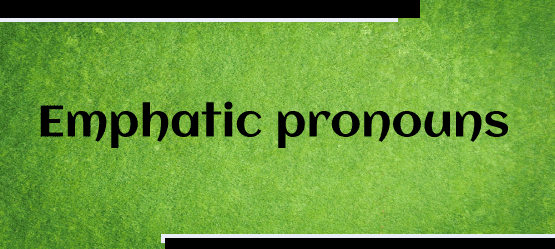
The pronouns can also be made by attaching or affixing the terms like -self (single) or -selves (plural) to certain personal pronouns. The noun numbers and gender decide them. Emphatic pronouns may also be utilized as reflexive pronouns. Their usage and purpose, however, are distinct. Emphatic Pronouns are also called the Intensive Pronouns. Emphatic pronouns are employed to stress their antecedent (the previous term to which they relate) and are frequently found straight after the noun they are trying to emphasize. Myself, yourself, herself, himself, himself, itself, ourselves, yourselves, and themselves are the emphatic pronouns. These terms can be either emphatic or reflexive pronouns. Read on and have a look at a few examples;
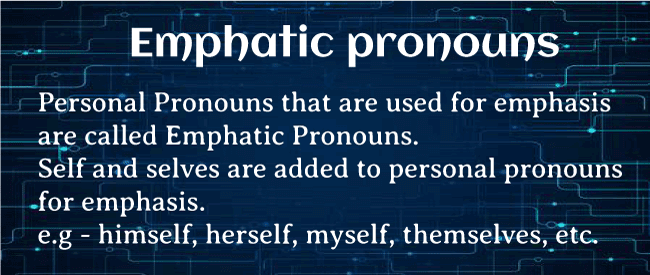
Using Emphatic Pronouns1. To emphasize another word (or pronoun) in the statement, an emphatic pronoun harks back to it. As an example: The Queen herself was present during the event. (The Queen is the stressed noun.) It is known as the emphatic pronoun's antecedent.) A term like herselfis known as an emphatic pronoun when it is used to emphasize something. 2. The emphatic pronouns are not allowed for use as subjects. So therefore, it is incorrectto say:
Whereas the correction of these is
3. These pronouns can never be employed as the subjects or the objects of the statement until a noun/ pronoun which it is implying to comes prior to it. Himself will visit the clinic- Incorrect. He himself will visit the clinic- (Correct A pronoun "He" comes before "himself") Themselves operated the cruise - Incorrect They themselves operated the cruise- Correct Anu and herself are nurses- Incorrect Anu and she are nurses- Correct Note- Unlike emphatic pronouns; reflexive pronouns can never perform as the subjects- neither separately nor as to the part of the subject phrase)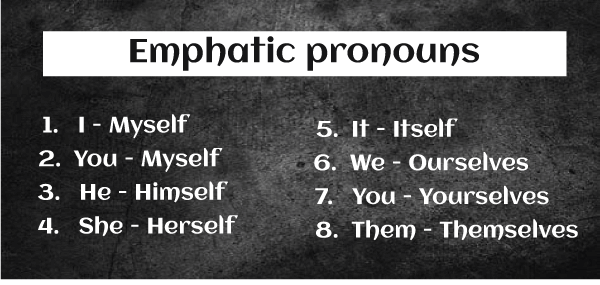
4. Irrespective of its functionality in the phrase or the statement, emphatic pronouns should be in synchronization with the nouns or the pronouns that it is utilized for. The girls herself went swimming - incorrect - girls- plural; herself is singular) The girl themselves went swimming - Correct He completed the assignment herself - incorrect- he male; herself - female) He completed the assignment himself. - Correct 5. Emphatic Pronouns can be utilized to stress or emphasize on both the subjects and the objects. Emphasizing the SubjectWhenever the emphatic pronoun stresses the subject, we can shift or alter its position, facilitating positional mobility. He himself prepares the dish - himself is emphasizing or stressing the subject which in this statement is he; moreover, it appears just after the subject) He came himself - he is the subject which is being emphasized by the term "himself" and appears after the intransitive verb - came. He prepares the dish himself - himself is being emphasized by the subject - he and appears after the transitive verb dish, and the object here is the dish. Emphasizing the ObjectWhenever the emphatic pronoun emphasizes or stresses the object, we place the reflexive pronoun after the object in the statement. I met Anu herself- correct - Anu- object and herself is emphasizing the object) Let us have a look at some other uses of Emphatic Pronouns as well Very often, emphatic pronouns can be utilized for meaning also or too. Geeta said she was feeling sad. I was feeling sad myself- (here means- too) We often employ the emphatic pronoun to express or indicate that someone has the capability enough alone too. They don't require any advice. They can manage themselves- i.e., they can do it all alone. At times we even utilize emphatic pronouns to depict the contrast. You favor BJP's? I am in favor of AAP myself (i.e., I am at the opposite or the contrast with your choice) Emphatic Pronoun vs. Reflexive PronounWhen the doer and recipient of an act is the same person, reflexive pronouns are employed as objects. They could be direct objects, indirect objects, or prepositional objects. The emphasis of the phrase remains on the verb when we utilize them. If a reflexive pronoun is omitted from a statement, the sentence may stop making sense. Emphatic pronouns are employed to highlight or emphasize the subject. They shift the emphasis away from the verb and toward the subject of the sentence. If we omit an emphatic pronoun from a statement, it makes absolutely no difference in terms of context or grammar. Reflexive Pronouns are utilized or employed in referring back to the subject in the statement or the phrase. Moreover, they form a crucial part of the statement and are utilized as the object of the verb. Whereas the emphatic pronouns are utilized to emphasize their antecedents (Noun or the Pronoun) 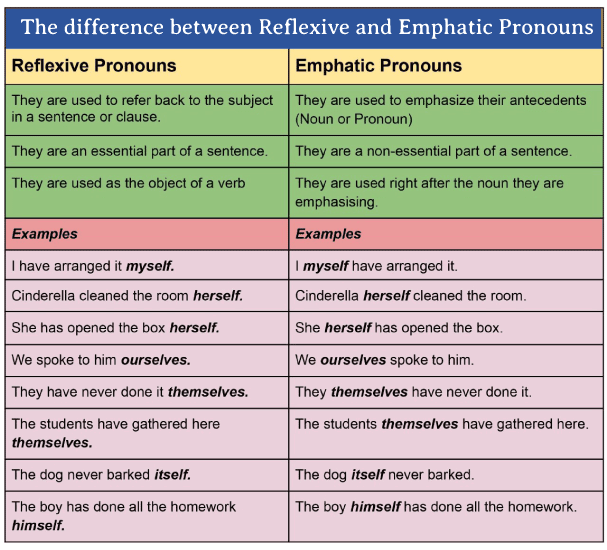
Moreover, they are a non-important part of the statement and are utilized just after the noun they are stressing on. He baked a piece of bread. He baked himself a piece of bread. (Reflexive Pronoun - in this case, it signifies that the subject 'he' has performed the verb of baking the bread for himself. The verb is the focal point.) He himself baked a piece of bread. (Emphatic Pronoun - the emphasis here is on the fact that 'he' completed the verb on his own without any assistance.) He baked the bread himself. (Emphatic Pronoun - The same meaning as the preceding sentence, but the pronoun's position is different.) 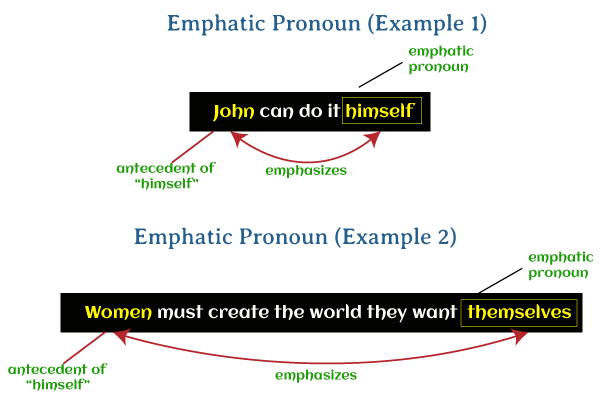
Now let us see another example
We can observe in the preceding phrases that removing the emphatic pronouns does not affect the meaning of the sentence. However, removing a reflexive pronoun may alter the meaning of the phrase. Examples:
We cannot eliminate the reflexive pronouns in the preceding sentences without affecting the statement's meaning.
Next TopicObject Pronouns
|
 For Videos Join Our Youtube Channel: Join Now
For Videos Join Our Youtube Channel: Join Now
Feedback
- Send your Feedback to [email protected]
Help Others, Please Share









